Moonlight interview: Naomie Harris on the Oscar-nominated role she vowed she'd never take

This week sees the release of Barry Jenkins’ multi Oscar-nominated masterpiece ‘Moonlight’ (in cinemas Friday, 17 February). The moving coming-of-age tale of a young man – Chiron – and his identity struggles in a deprived Miami neighbourhood is up for 8 Academy Awards including Best Picture, Best Director, and Best Adapted Screenplay.
James Bond star Naomie Harris is also rightly nominated for Best Supporting Actress (although she faces a tough uphill battle to beat Viola Davis in ‘Fences’ to the prize) playing Chiron’s drug-addled mother Paula.
The Oscar nominations worth celebrating
Oscar-winning stars who don’t use their real names
2017 Oscar nominations: Big shocks and surprises
The performance, which comes in three parts and is set during three different time periods, sees Paula and Chiron at distinctly different stages of their journeys, with each snapshot requiring a totally different range of emotions. Paula goes from distant mother to ravaged junkie to a reformed woman desperately trying to reconnect with her estranged son, and it’s an astonishing performance when you consider all the hurdles Harris had to overcome to commit the character to screen.
We chatted with Harris following the film’s UK debut at the London Film Festival last year where she explained how she landed the role of Paula despite the director not knowing who she was, despite her rules of “never playing a crack addict”, and despite the fact she only had three days to shoot the film during a break from the gruelling global press tour for ‘SPECTRE’.
Yahoo Movies: How did you first get involved with ‘Moonlight’?
Naomie Harris: I first got involved because Jeremy Kleiner, who’s one of the producers, he approached me and he said that they would like me to be involved. He actually told a bit of a fib because he said Barry [Jenkins – the director] loved my work and really wanted me to do it. Meanwhile I discovered, only while doing press, Barry hadn’t seen any of my work! And it was just Jeremy being a producer… but it worked and it was brilliant, and that’s how he brought us together.
And you shot your part in just three days, while you were in America doing James Bond press?
Yeah, I was doing the press tour for ‘SPECTRE’, so I only had three days so I had to just fly in, hit the ground running, come to Miami with no rehearsals and get it done basically. We were shooting out of sequence because everything was dependent on location rather than the sequence of the movie.

So I was doing Paula in rehab, jumping back to Paula in the beginning when she’s got her addiction under control, then jumping to Paula when her addiction is way out of control, then back to being older Paula in rehab… it was… challenging would be an understatement, but it was also hugely rewarding.
It’s the kind of role that you live for. As an actor you dream of getting roles like this so it was such a gift.
How did you keep track of Paula’s state of mind on set?
Because you know you’ve only got three days, because you know it’s going to be tough, the main thing is you have to do all of your research beforehand. You have to know the character inside and out, and you have to keep track of it. Obviously Barry is there to guide you as well, but I really had to know Paula deeply.
And what research did you do for the role?
I had a month of research, but I didn’t have time on set for rehearsals. You know YouTube is an amazing mine of information; it’s incredible. It’s brilliant for doing research because you can find absolutely anything and everything on there. There are tons of these really fascinating documentaries about crack addiction, interviews with crack addicts, documentaries particularly about the rise of crack addiction in the 80s in Miami, so despite the fact that obviously I’m English, I live in London – I’ve been to Miami actually, but I’ve certainly never been to an area like Liberty City – but I was able to watch all these documentaries which gave me access and created that whole reality for me, it brought it all to life for me.
Then I interviewed a crack addict as well, and she was very kind, she shared her story with me. Then it was about using that mine of information to go on a journey, to create a whole narrative around Paula’s story and to bring her to life.
What I love about the film is how much they don’t show on screen too, did Barry fill out the years in between for Paula with you too?
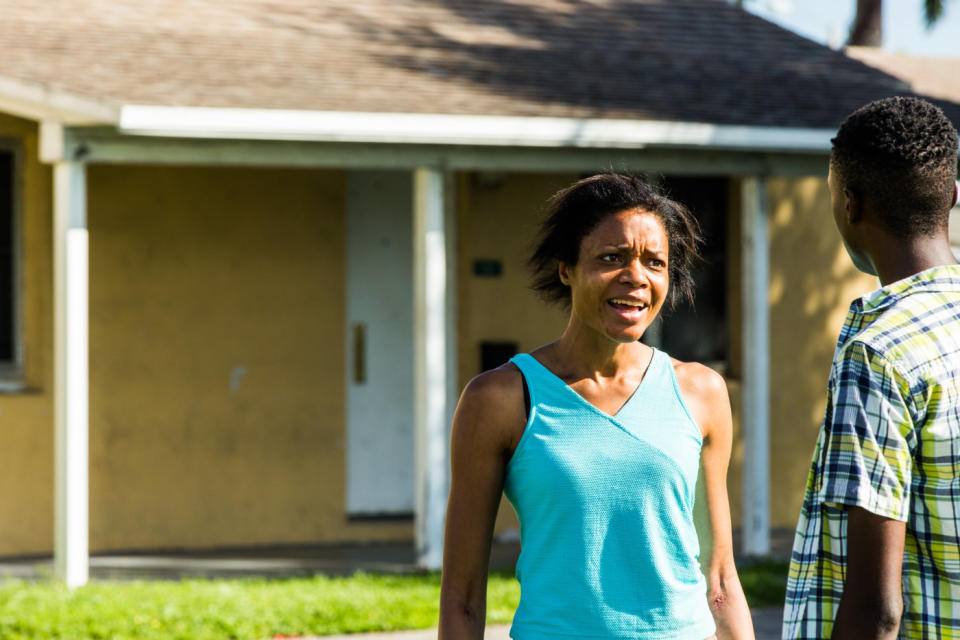
No. It was all stuff that I had to build. We didn’t have the luxury of rehearsals where you normally talk at length about these kinds of things and share ideas and so on. It wasn’t like that. So I just had to use what I had, what I’d found myself to create the story, but they were really useful pieces of information.
There was one description of what it’s like to be on drugs – because I don’t smoke, I don’t drink alcohol, I don’t even drink coffee, so for me for playing a crack addict is a massive leap – so what really helped me, actually there were two things that really helped… the first thing was there was one woman who described in an interview what it’s like to get addicted to crack and she was saying “crack is like the most seductive, incredible lover” so it gives you the highest high you’ve ever had in your life, you feel amazing, you feel the most confident, the most beautiful, all your problems go away, and life feels amazing.
But… it’s like an abusive lover. So once you’re hooked, and it’s got its claws in you, then it starts to totally destroy you. Then at this point you start to hate the drug, but at the same time you’re hugely addicted to it, and all you can think about is getting that drug. In that journey you lose yourself completely and you become highly aggressive, irritable, and irrational. That for me I could really understand what that was like. That was a really vivid image for me which I could use to help create this character.
The other thing that really helped was that I discovered from doing my research that every single one of the women that I learned about, they’d all had some form of sexual abuse or been raped. It was like the trauma of that created this kind of split in their personalities.
So you had the outside veneer of: ‘I’m OK, I’m getting on with my life’, but underneath that you have this incredible amount, this well of pain, of emotional pain, that has not been healed, and so they’re looking for some way of having an out, and that’s what drugs offers them. That, again, I could really relate to because I think we are all in some form of pain, we have all suffered some form of trauma, and we’re all trying to escape it in different ways.
And this isn’t the sort of role you usually take – what convinced you?
I wasn’t looking for this kind of role because, as an actor, you don’t really have much power in terms of you’re not generating the material, you’re not producing it, you’re not directing it, so the only power you have – and once you’ve acted in something you hand it over, then someone else dissects it, and does what they want with it, and you don’t have power over that either – so the only power I think you have as an actor is your choices.
So, I was very clear, always from the very beginning of my career, that I wanted to represent women, and particularly black women in a positive light. I wanted to choose roles based on whether they provided positive role models for women, and I drew the line at a crack addict. I said, in my mind, I will never play a crack addict.
And then I got this beautiful script which really moved me, by an incredible filmmaker as well, but it was playing a crack addict. So I was really in a dilemma, and my agent very cleverly said, ‘just speak to the director about it’. And I spoke to Barry and he said, ‘look, I feel the same. I don’t want to present the world with negative images of black women at all, but this is the story of my mother. This is the story of Tarell [Alvin McCraney], the writer, his mother as well, so what do we do? Do we remove them from our stories? Or how do we tell our stories without telling the stories of our mothers?’
And I’ve never had anyone ask me to play their mother before, so that’s what deeply moved me and I thought ‘OK, I’m gonna do this’.
So how much of the story is autobiographical for Barry and Tyrell?
I think quite a lot of it is a real story. It is their lives.
I feel like it’s a universal story of loneliness, of not being able to connect with the people around you, is that something you relate to too?
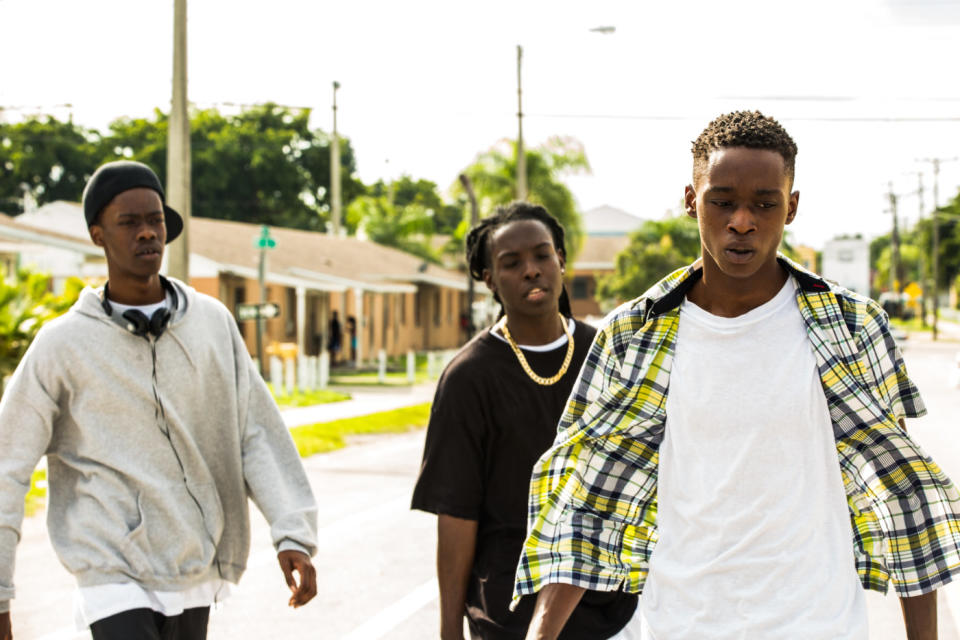
What, for me, is really special about the movie, and what I really relate to is that I just think that the real message is about love and the power of love, the healing power of love. You can come from all different walks of life, have all different issues, and that everybody is basically struggling with the same issue.
Issues of identity, issues about who you are, how do you belong, how do you fit it, all of these things, but actually it’s how love has the ability to transform all of that, and heal all of that. But, to achieve, to find love, you have to be vulnerable; you have to let your guard down, so that’s what I really related to.
The film talks about how Chiron has to build himself from the ground up, that he has to present an idea of masculinity – is that something you talked about on set too?
We didn’t have the luxury of being able to talk about these concepts but it’s wonderful that we do now, and I really agree with that. The idea that a lot of the misconceptions about what it is to ‘be a man’ is the idea of ‘strength’, it’s about this defended position, that it’s about physical displays of strength.
What’s wonderful about the film is that it really deconstructs all of those and says underneath it we’re all the same. We all have this beating heart; we’re all yearning for a connection in love, and for acceptance. There’s real vulnerability in all of us.
In 2016, it feels like the LGBTQ community has more freedom to be themselves than ever before, but Moonlight suggests it may not be true of the black community, particularly in areas like Liberty City?
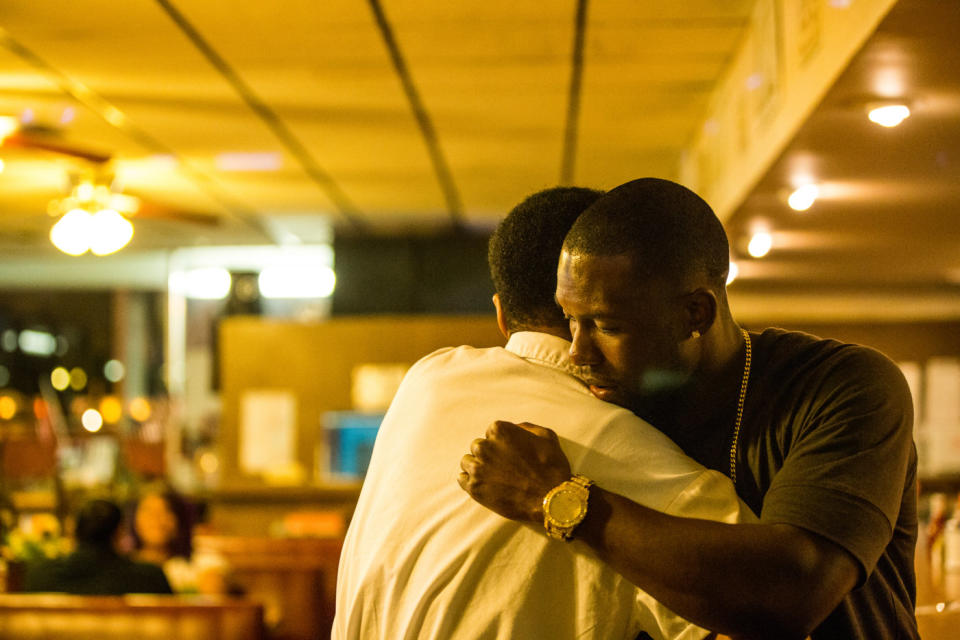
I think in some sections of society… I live in London, so often we have this London-centric view that ‘it’s OK, everybody can come out and be who they want to be’ because in London that largely seems to be the case generally. But there are huge swathes of society and huge areas in the United States and as well as going just a bit out of London, where it’s just not acceptable, it’s not OK.
And that’s what’s great about the movie, that it sheds light on those communities and says how hard it is to just be yourself. Life is hard enough as it is without having to deny who you fundamentally are.
Is it something that Hollywood has a problem with too?
I think Hollywood does have a problem with it. It’s bizarre because Hollywood is full, literally loads of gay men and lesbian women who work in the industry, but it’s very rare that you get those men and women represented on screen, so there’s obviously some issue going on there in terms of people being comfortable with coming out and having those images on screen, for whatever reason.
What’s your theory?
I don’t know. For me it doesn’t make any sense, it really doesn’t. It’s so funny because now we’ve done the movie, people have said ‘there’s this issue of sexuality’ and I’ve just been like ‘well, yeah!’ For me it’s like ‘d’uh!’ I don’t get why it’s even an issue.
It wasn’t even part of my decision making process at all, I just thought this was a beautiful love story and for me love is love. It doesn’t matter who it’s happening between, so long as it’s consenting adults, you know what I mean? So I don’t get it. I don’t understand it; it makes no sense to me. I just wish everybody would be more tolerant.
Was shooting this between doing James Bond press a welcome relief?
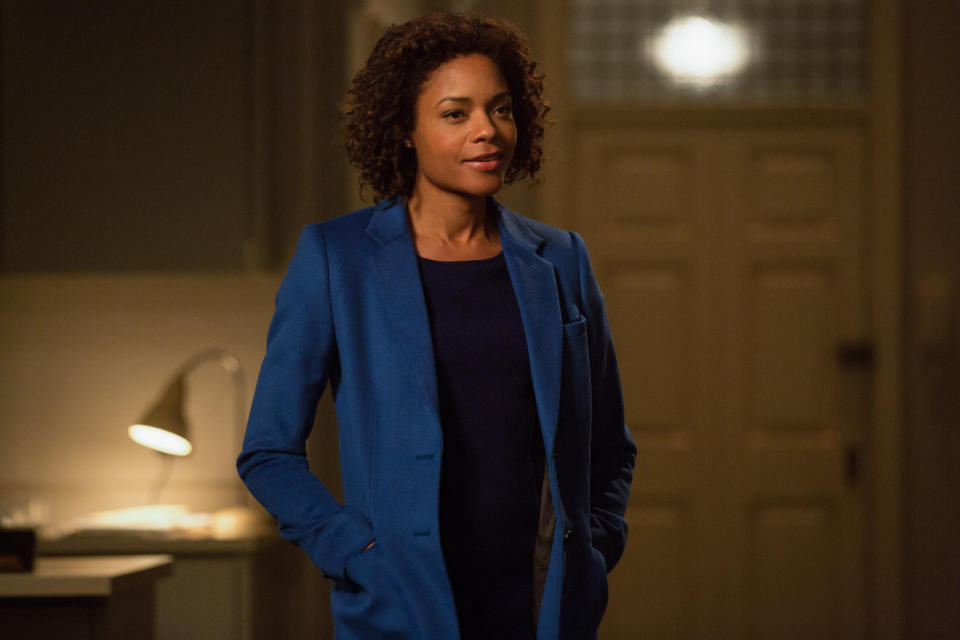
The press is great, because what you want to do is that you want to publicise your work. Particularly for a movie like this that you’re very proud of and it has a very beautiful message and it’s a healing film, you want to do as much press and make as much noise as you possibly can. But what really I enjoy is the work. I want to be filming rather than doing a junket, ultimately, so it was wonderful to get the opportunity to get away for three days and just do my craft, do what I love.
You also shot ‘Miami Vice’ in Miami, and that was a famously difficult shoot – was this easier?
So easy! It was so bizarre actually because before I went, people were telling me ‘we’re going to be shooting in Liberty City, it’s one of the most deprived neighbourhoods in the United States’ and it was nerve-wracking thinking about how it was going to be, so I was a bit apprehensive about it. But it was like the easiest shoot imaginable. People were so polite and I think it’s because it is a community that… no-one goes to Liberty City to film!
And I think people were so proud and so delighted that we were there, and also because Barry is from Liberty City and they were so proud of him and his achievement. It was so inspiring to the young kids in the community so they really welcomed us and it ended up being the easiest shoot I’ve ever done.
And the ‘Miami Vice’ shoot, was it as bad as they say?
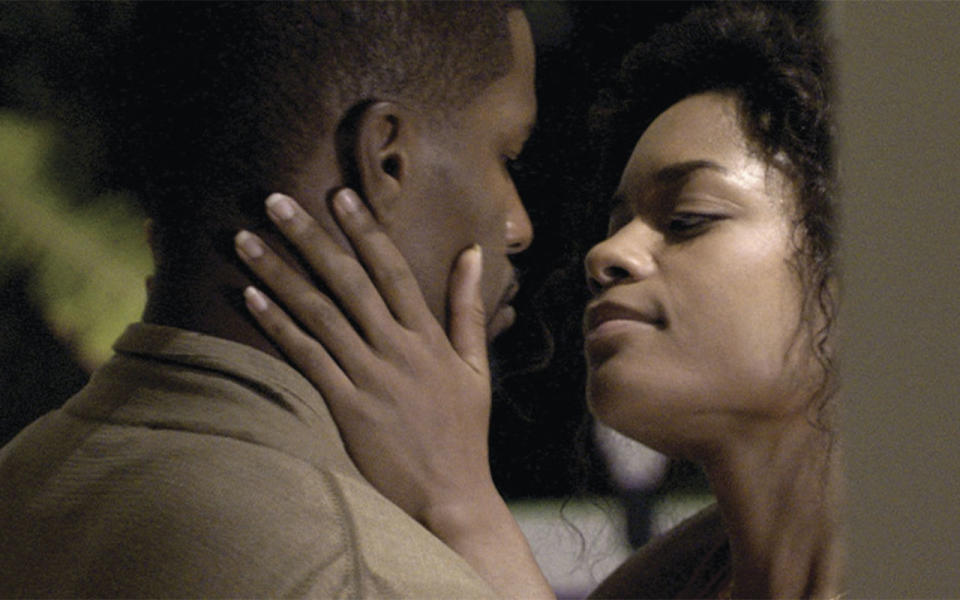
That was many, many years ago. It wasn’t an easy shoot. For starters we were countless night shoots – I don’t remember how many – that whole film was set at night, and it didn’t have to be, but Michael Mann, because he likes realism, we would wait for the dark, even when we were doing shoots inside, where you could easily black out the windows, we’d still do them at night. I just remember it being very gruelling.
I love that movie…
You? You were the one person that went to see that movie! I think everyone else was like ‘I don’t like that movie’.
Recent statistics showed that 60% of British films within the last 10 years didn’t feature a single black actor, which is astonishing. Do films like the 007 franchise have a responsibility to lead from the front in areas like that?
I think they absolutely do. It should be part very filmmaker’s working process to recognise their responsibility to represent society as a whole, as it is. The fact of the matter is we do live in a society that’s incredibly ethnically diverse, so it’s bizarre no to represent that on screen.
It’s weird that there’s this lag, this time lag between what’s actually happening on the ground in the real world, and what’s happening and being represented on screen. That’s why films like Moonlight are so hugely important because it gives an opportunity to people who don’t normally get represented, who don’t normally get seen – there they are, light is being shed on them.
‘Moonlight’ is in UK cinemas from 17 February.
Read more
‘La La Land’ director Damien Chazelle’s five favourite musicals
M Night Shyamalan’s studio struggles
Rogue One’s editors spill the beans on the reshoots

 Yahoo Movies
Yahoo Movies 

